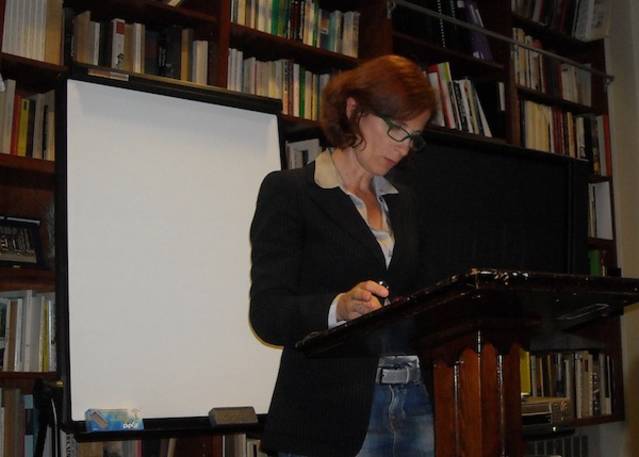


After her interview with i-Italy before her arrival in New York, on Friday, writer Margaret Mazzantini read selections from her novel “Venuto al Mondo”, followed by a reading from the English translation, “Twice Born” [2], by actress, writer and translator, Patricia Chen. Casa Italiana’s library offered an intimate atmosphere: her voice made the book even more loquacious, thanks to its emotional tension and narrative complexity, which penetrates the reader’s imagination.
The novel was written over a long six year period. The author explained: “It was a period during which I studied closely the places of the Bosnian war tragedy; my study was filled with maps, documents and books. I got the idea for this tale when the war broke out. I had just given birth to my first child, Pietro, and I was frequently up during the night feeding him while the terrible scenes of those massacres streamed on television. Then time passed and I needed to absorb those images. Only after a few years did I begin to write. I went to Sarajevo and tried to study that place without missing any detail. There I met extraordinary people, humble, simultaneously light-hearted and bitter, the true Bosnian spirit”.
And Pietro, in the novel, is the name of the son that Gemma, the protagonist, will finally have, after much troubled search. ‘Venuto al mondo’ is the story of a long journey of a couple in search of paternity and maternity, a journey towards East, which winds up intertwining with the atrocities of the Serbian-Bosnian war.
The writer chose to read the section in which Gemma, unable to have children, and her husband Diego, decide to adopt a child and, in the midst of a long bureaucratic ordeal, are subjected to a number of meetings with a psychologist, discovering the deepest traumas of their lives. “I would have wanted a child with his eyes and shoulders. A son is like a padlock of flesh and bones. I’m afraid Diego might leave me” says Gemma. “She is a woman who becomes obsessed, blind, with a strong sense of guilt for her sterility and with the fear of her younger husband abandoning her. She becomes so obsessed that she begins making mistakes”, stated the author. “All the characters are a little crazy like she is: she left her first husband and a stable relation for a younger reckless man; Goiko, Gemma and Diego’s guide in Bosnia, is a cursed poet; but each one of them is in love with the future, because when you write about darkness you always need a little light” she concluded.
Mazzantini spoke about her relationship with her husband, actor Sergio Castellitto [3]: “He is my first reader; although men and women have a different sensibility and a different way in which they read stories, in our relationship we are perfectly in tune with each other: we are moved by the same things and we laugh at the same things, we trust and respect each other”. And this is why many have noticed a great contiguity between the book and the film ‘Non ti muovere’ [4]. To the question “So you were lucky to marry the director?” she ironically answered, “Perhaps he was lucky to marry the writer”.
The author gave us this intimate peek into the creative and sentimental relationship between two important personalities of the Italian literary and cinematographic panorama. What resulted was a sense of sharing and completing each other’s work. She disclosed that the book has been adapted into a screenplay for the film version that will be shot by her husband next September in Rome, Bosnia and Croatia and, as in ‘Non ti muovere’, will star the Spanish actress Penelope Cruz.
Margaret Mazzantini speaks rapidly, like her characters. When listening to her one feels placed inside of her stories. Frequently her fiction is strong, and her characters are exasperated. Many have wondered if the love of ‘Non ti muovere’ is actually true love, or if the story only gives the image of the free pouring out of a successful man with a woman he begins to dispose of and ends up tying to himself. In reading ‘Venuto al mondo’ one can grasp the idea of a woman who wants to have a son at any cost and who changes the lives of those that surround her. These are complex figures, personal dramas, and the reader is not left indifferent towards them and must take a stand.
As Stefano Albertini, director of Casa Italiana [5], stated in concluding the event, we now await the English translation of the new novel “Nessuno si salva da solo”, certain that it will not disappoint us.
Source URL: http://newsite.iitaly.org/magazine/focus/art-culture/article/live-reading-writer-margaret-mazzantini-casa-italiana-zerilli
Links
[1] http://newsite.iitaly.org/files/dscn13611304451095jpg
[2] http://www.pen.org/viewmedia.php/prmMID/5819/prmID/2126
[3] http://en.wikipedia.org/wiki/Sergio_Castellitto
[4] http://www.imdb.com/title/tt0330702/
[5] http://www.casaitaliananyu.org